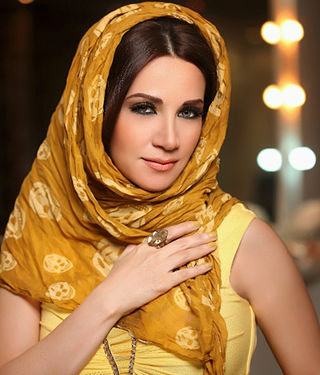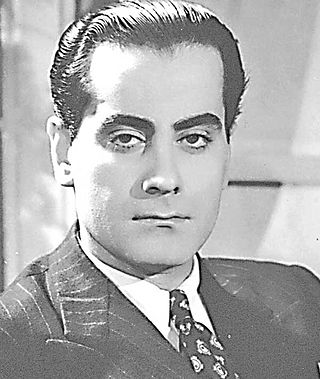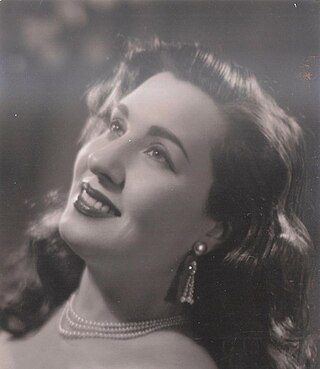
Samira Abdelrazak Bensaïd, professionally known as Samira Said, is a Moroccan-Egyptian singer who has lived in Egypt for more than 40 years and is known for her Egyptian Arabic genre.

Najwa Karam is a Lebanese multi-platinum singer, songwriter, producer, fashion icon, and TV personality. She has sold over 60 million records worldwide, and she became the highest selling artist in 1999, 2008, and 2011.

Nawal El Zoghbi is a Lebanese singer and actress.

Ya Salam is the third studio album by Lebanese singer Nancy Ajram. It was released on February 24, 2003 by Relax-In and Megastar. Ajram worked with all new collaborations, including Tarek Madkour, Adel Ayesh, Samir Sfeir, Salim Salameh and Tony Saba. Described as a turning point in Ajram's career, it represents a departure from the classical sound of her previous releases, Mihtagalak (1998) and Sheel Oyounak Anni (2001). Apart from the sound, she also endorsed a new image for the release going from an innocent girl to an edgier and more sexual look.

Diana Haddad is a Lebanese actress, singer, and television personality who also holds Emirati citizenship and is based in the United Arab Emirates. Haddad is one of the most popular Arabic pop musicians in the Arab World and has been so since the mid-1990s. Her debut album Saken (1996) was one of the best selling albums of 1996, being certified platinum by Haddad's label Stallions Records. The album also introduced Haddad and her Bedouin music style to the public.

Habeit Ya Leil is the fourth album of Nawal Al Zoghbi. It included three hit singles. It was a follow-up to the duo she performed live and recorded in 1996 with Lebanese Artist Wael Kfouri, Meen Habibi Ana.

Marwan Khoury is a Lebanese singer, writer, composer and music arranger. He has composed hits for artists such as Majida El Roumi, Saber Rebaï, Nawal Al Zoghbi, Assala Nasri, Najwa Karam, Fadl Shaker, Elissa, Carole Samaha, Bassima, and Myriam Fares.

Youm Aleek is the last studio album by the late Tunisian Diva Thekra and was produced by Rotana in 2003.

Farid al-Atrash, also spelled Farid El-Atrache, was a Syrian-Egyptian singer, oudist, composer, and actor. Although born in Syria, he immigrated to Egypt at the age of nine with his mother and siblings, where he eventually became one of the most noted figures in 20th-century Arabic music.

"Helwa ya baladi" is an Egyptian Arabic song by Dalida from 1979, enjoying great popularity in the Middle East and the Arab diaspora. The song is an homage to Egypt, Dalida's birthplace, and is considered representative of the nationalistic pride felt by many Egyptians.
Nelly Artin Kalfayan, better known by only her mononym Nelly, is an Egyptian actress, singer, comedian, dancer, television personality, and all-around entertainer.

Hussain Al Jassmi is an Emirati singer and musician who is well known in the Arab world. Al Jassmi was born in Khorfakkan in August 1979 to an Emirati father and an Egyptian mother. He released his first single "Bawada'ak" followed by "Wallah Mayiswa" and "Bassbour Al Fourgakom". In 2008, Al Jassmi received the Murex d'Or award, under the category of "Best Arabic Male Singer."
"Libya, Libya, Libya", also known as "Ya Beladi", has been the national anthem of Libya since 2011; it was previously the national anthem of the Kingdom of Libya from 1955 to 1969. It was composed by Mohammed Abdel Wahab, in 1951, with the lyrics being written by Al Bashir Al Arebi.

Elissar Zakaria Khoury, commonly known as Elissa, is a Lebanese singer, actress, television personality and businesswoman. Known for her romantic musical style and emotive vocal performances, she has been dubbed as the "Queen of Emotions" by fans and journalists alike. Her musical career began in 1992 when she was featured in the Lebanese talent show Studio El Fan; later being awarded the silver medal. In 1998, she released her debut studio album Baddy Doub through EMI Music Arabia. While the album was a success, the titular song’s music video initially received criticism for its racy content. Her second album W'akherta Maak (2000) featured the single "Betghib Betrouh", a duet with Ragheb Alama which achieved commercial success and won accolades.

Dounia Batma is a Moroccan singer and actress who rose to popularity around the world as the runner-up of the first season of Arab Idol on MBC. She lost the title against Egyptian contestant Carmen Suleiman. She married Mohamed Al Turk, the father of Bahraini singer Hala Al Turk.
Saad Lamjarred is a Moroccan singer, songwriter, actor, multi-instrumentalist, dancer, and record producer. His official music video for "LM3ALLEM" has received over 1 billion views on YouTube. Saad Lamjarred has had 16 songs so far.

Randa Hafez is an Egyptian singer and actress. She started her career as a TV commercial actress. She then worked as a TV presenter in artistic and sport TV shows on Mehwar TV Channel. Her start in singing started in season two of the popular talent shows Star Academy. She gained a wide popularity after the show and entered the acting industry through her participation in the Lebanese TV series Saeat bial'iidhaea with George Khabbaz. In 2009, she released her first album titled Mayala; the album achieved big hits not only in Egypt and the Arab world, but also throughout the world. The song “Gwaya Kteer”- one of her album’s songs - was translated into Turkish language with the voice of the Turkish singer “Sinan Akçıl”. The Bodrum album for international music also included the song “Gwaya Kteer” performed by Randa in Arabic. This was the first time an Arab singer participates in this album.

Kheirieh Jarkas, known mononymously as Nourhane, was a Syrian singer.
The Game of Each Day is an Egyptian film released on August 2, 1971. The film is directed by Khalil Shawki, features a screenplay by Ahmed Lotfy with help from Abdel Majid Abu Zaid and Abdel-Kader Telmissany on scenario and dialogue, and stars Magda El-Khatib, Nabila Ebeid, Taheyya Kariokka, Ezzat El Alaili, and Abdel Moneim Ibrahim. The plot features a taxi service worker named Shabara who falls in love with a woman named Anshirah but incurs the jealousy of a man named Ibrahim, who plots to keep them apart.

Laila Taher born Sherouette Moustafa Ibrahim is an Egyptian film, stage, television actress and presenter who is mostly known for her successful collaborations with Salah Zulfikar in film, television and theater. She participated in over hundred artworks through her career mostly in television. In films, Laila Taher is known for her notable roles in; Saladin the Victorious (1963), Soft Hands (1963), A Husband on Vacation (1964),The Peacock (1982) and Monsieur le Directeur (1988).
















